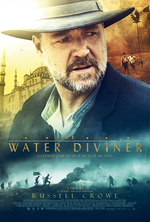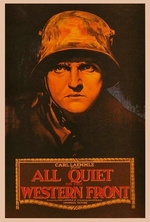Film Screening 20th March, 2015

The Water Diviner
7:30 PM, 20th March, 2015
No Guests
- M
- 111 mins
- 2014
- Russell Crowe
- Andrew Knight, Andrew Anastasios
- Russell Crowe, Jai Courtney, Olga Kurylenko, Yilmaz Erdogan
The latest entry into the World War I film genre, this epic historical drama is also Russell Crowe’s directorial debut. It follows the story of Joshua Connor (Crowe), an Australian farmer whose three sons go off to fight and never return. In 1919 he resolves to bring their bodies back home and manages to trace them to a cluttered battlefield in a far flung place called Gallipoli. From there, he must contend with the hierarchy of the British military, the cultural barriers with the recent enemy and his own grief.
Apparently this story was inspired by a line found in a letter from Lieutenant Colonel Cyril Hughes in Turkey, who wrote ‘One old chap managed to get here from Australia looking for his son’s grave’. It’s an evocative idea which has been well executed.
The film’s title refers to Connor’s heralded skill and also serves as a metaphor of sorts for his endeavour – though the extent of your enjoyment of this movie may depend on your threshold for sentimentality. Regardless, this is a solid Australian film about the often overlooked period immediately following the war’s end, and about what happens to those left when the cannons are stilled.
Crowe is dependably good as the titular character and has surrounded himself with a talented ensemble. Putting aside any quibbles regarding historical accuracy, whether you’re looking for something to make patriotic hearts swell or just a gripping yarn, this is sure not to disappoint.
Emma Petrie

All Quiet on the Western Front
9:31 PM, 20th March, 2015
- PG
- 126 mins
- 1930
- Lewis Milestone
- Maxwell Anderson, George Abbott, Del Andrews
- Lewis Ayres, Louis Wolheim, John Wray, Ben Alexander
The first Best Picture Academy Award winner was a silent film. The second was a musical called The Broadway Melody – that title gives you an indication of how much it has dated. The third winner, this one, was the first truly modern drama to win – a rare 1930 film that completely transcends its time and place. In all but the most trivial respects (black and white, mono recording, Academy ratio, that type of thing) it could have been made yesterday.
We follow the fortunes of a group of schoolboys who eagerly sign up to be shot at in the First World War, and watch as they are abused, disillusioned, and – we wait nervously for it to happen – killed. The tragedy is told from the German point of view (based on a German novel, written by a German soldier), perhaps all the more tragic because we know we’re watching the losing side.
Although the film was not shot on location, it might as well have been: bombed-out muddy trenches are the same everywhere. These particular ones are, in one way, authentic – duplicated for the screen by the same people who had been fighting in them only a dozen years earlier. I’m not surprised the film was banned in Germany (by the Nazis, not the Weimar Republic) nor even in France. I am a little surprised to find it was banned in Australia, during the ’30s, when there wasn’t even a war on. It touched a nerve – and still does.
Henry Fitzgerald